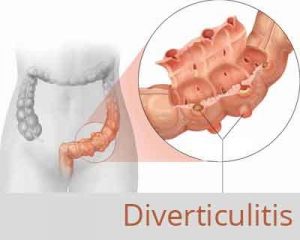- Home
- Editorial
- News
- Practice Guidelines
- Anesthesiology Guidelines
- Cancer Guidelines
- Cardiac Sciences Guidelines
- Critical Care Guidelines
- Dentistry Guidelines
- Dermatology Guidelines
- Diabetes and Endo Guidelines
- Diagnostics Guidelines
- ENT Guidelines
- Featured Practice Guidelines
- Gastroenterology Guidelines
- Geriatrics Guidelines
- Medicine Guidelines
- Nephrology Guidelines
- Neurosciences Guidelines
- Obs and Gynae Guidelines
- Ophthalmology Guidelines
- Orthopaedics Guidelines
- Paediatrics Guidelines
- Psychiatry Guidelines
- Pulmonology Guidelines
- Radiology Guidelines
- Surgery Guidelines
- Urology Guidelines
Management of acute diverticulitis : American Gastroenterological Association Institute guideline

Acute diverticulitis, defined as clinically evident macroscopic inflammation of a diverticulum or diverticula, occurs in approximately 4% of patients with diverticulosis; roughly 15% of those patients will have complicated disease, defined as an abscess, perforation, fistula, or colonic obstruction, and 15% to 30% will experience recurrence
Given the significant burden of disease and the evolving scientific literature, the American Gastroenterological Association in December 2015 came out with the guidelines on Management of acute diverticulitis and has identified acute diverticulitis as a priority for an updated guideline. the guideline does not address other manifestations of diverticular disease, such as symptomatic uncomplicated diverticular disease, diverticular bleeding, and segmental colitis associated with diverticulosis, and does not examine the prevention of incident diverticulitis or the management of complicated disease. Reference to surgical society and international guideline recommendations is made when appropriate
Following are the major recommendations of the guidelines
Question 1. Should antibiotics be routinely used in patients with acute uncomplicated diverticulitis?
The American Gastroenterological Association (AGA) Institute suggests that antibiotics should be used selectively, rather than routinely, in patients with acute uncomplicated diverticulitis. (Conditional recommendation, Low quality of evidence).
Question 2. Should a colonoscopy be performed after an episode of acute diverticulitis confirmed by computed tomography (CT) scan?
The AGA suggests that colonoscopy be performed after resolution of acute diverticulitis in appropriate candidates to exclude the misdiagnosis of a colonic neoplasm if a high-quality examination of the colon has not been recently performed. (Conditional recommendation, Low quality of evidence).
Question 3. Should elective colonic resection be performed after an initial episode of acute uncomplicated diverticulitis?
The AGA suggests against elective colonic resection in patients with an initial episode of acute uncomplicated diverticulitis. The decision to perform elective prophylactic colonic resection in this setting should be individualized. (Conditional recommendation, Very low quality of evidence).
Question 4. Should a high fiber diet, rather than a regular diet, be advised in patients with a history of acute diverticulitis?
The AGA suggests a fiber-rich diet or fiber supplementation in patients with a history of acute diverticulitis. (Conditional recommendation, Very low quality of evidence).
Question 5. Should consumption of nuts and popcorn be avoided in patients with a history of acute diverticulitis?
The AGA suggests against routinely advising patients with a history of acute diverticulitis to avoid consumption of nuts and popcorn. (Conditional recommendation, Very low quality of evidence).
Question 6. Should aspirin be avoided in patients with a history of acute diverticulitis?
The AGA suggests against routinely advising patients with a history of acute diverticulitis to avoid the use of aspirin. (Conditional recommendation, Very low quality of evidence).
Question 7. Should nonaspirin nonsteroidal anti-inflammatory drugs (NSAIDs) be avoided in patients with a history of acute diverticulitis?
The AGA suggests advising patients with a history of diverticulitis to avoid the use of nonaspirin NSAIDs if possible. (Conditional recommendation, Very low quality of evidence).
Question 8. Should mesalamine rather than placebo be used in patients with a history of acute uncomplicated diverticulitis?
The AGA recommends against the use of mesalamine after acute uncomplicated diverticulitis. (Strong recommendation, Moderate quality of evidence).
Question 9. Should rifaximin rather than placebo be used in patients with a history of acute uncomplicated diverticulitis?
The AGA suggests against the use of rifaximin after acute uncomplicated diverticulitis. (Conditional recommendation, Very low quality of evidence).
Question 10. Should probiotics rather than placebo be used in patients with a history of acute uncomplicated diverticulitis?
The AGA suggests against the use of probiotics after acute uncomplicated diverticulitis. (Conditional recommendation, Very low quality of evidence).
Question 11. Should vigorous physical activity rather than regular activity be encouraged in patients with a history of acute diverticulitis?
The AGA suggests advising patients with diverticular disease to consider vigorous physical activity. (Conditional recommendation, Very low quality of evidence).
For detailed guidelines, click on the following link:
http://www.gastrojournal.org/article/S0016-5085(15)01432-8/pdf

Disclaimer: This site is primarily intended for healthcare professionals. Any content/information on this website does not replace the advice of medical and/or health professionals and should not be construed as medical/diagnostic advice/endorsement or prescription. Use of this site is subject to our terms of use, privacy policy, advertisement policy. © 2020 Minerva Medical Treatment Pvt Ltd